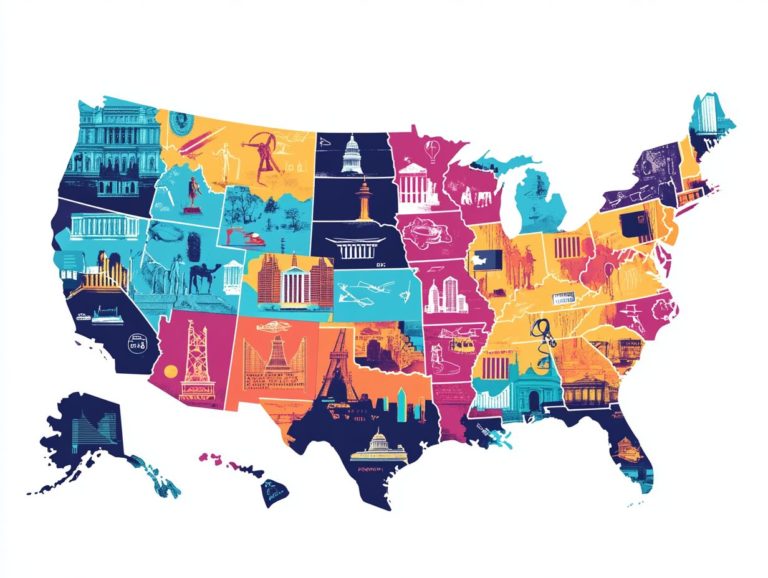How to Choose the Right Tax Software as a Freelancer
Freelancers encounter distinct challenges in managing their taxes. With diverse income streams and specific deductions, grasping these intricacies is vital for achieving financial success.
This article delves into essential tax considerations tailored for freelancers, showcasing the advantages of utilizing tax software while guiding you through the process of selecting the ideal platform.
It offers a comparison of leading options, discusses key features, and shares valuable tips to help you maximize your software investment. Simplifying your tax process is just a read away!
Contents
- Key Takeaways:
- Understanding the Tax Needs of Freelancers
- Benefits of Using Tax Software
- Factors to Consider When Choosing Tax Software
- Top Tax Software Options for Freelancers
- Tips for Maximizing the Use of Tax Software
- Frequently Asked Questions
- What is tax software and why should freelancers use it?
- What factors should I consider when choosing tax software as a freelancer?
- Do I need to purchase a specific type of tax software as a freelancer?
- Can I use the same tax software for both personal and business taxes?
- Are there any free tax software options for freelancers?
- Can I switch tax software if I am not satisfied with my current one?
Key Takeaways:

- Understand your unique tax needs as a freelancer, including deductions and expenses, to choose the right tax software.
- Consider the benefits of using tax software, such as time and cost savings, accuracy, and organization of your tax information.
- When choosing tax software, evaluate features, pricing and plans, and customer support to find the best fit for your needs.
Understanding the Tax Needs of Freelancers
Understanding your tax needs as a freelancer is essential as you navigate the intricate world of self-employment. You face unique challenges that set you apart from W-2 employees.
Unlike traditional employees, you must take charge of your financial tracking, carefully managing both your income and expenses. You’re also responsible for filing your own tax returns. This involves calculating various deductions that can effectively reduce your taxable income.
This careful approach ensures your compliance with IRS regulations while maximizing your potential tax write-offs.
Unique Tax Considerations for Freelancers
Freelancers encounter distinct tax considerations due to their status as independent contractors. You ll need to familiarize yourself with forms like Schedule C and Schedule SE when it comes time to file your self-employment tax returns.
It s important to understand the differences in tax treatment between 1099 contractors and traditional W-2 employees. Unlike W-2 workers, freelancers don t have taxes automatically withheld from their earnings. This means you must carefully track your income and expenses.
This meticulous record-keeping is vital, especially given the potential for IRS audits that may arise from any misreported income or deductions. To enhance your tax situation, take advantage of various deductions available to you, such as:
- Home office expenses
- Mileage
- Supplies
Implementing smart strategies can significantly reduce your tax liabilities. For example, making estimated tax payments and consulting with a tax professional can help ensure compliance.
Benefits of Using Tax Software
Utilizing tax software presents substantial advantages for freelancers, allowing for efficient financial tracking and simplifying the often tough tax calculations associated with self-employment.
With programs like TurboTax, H&R Block, and QuickBooks, you gain access to user-friendly interfaces and mobile-friendly options. These tools transform tax filing into a more manageable task, enabling you to streamline bookkeeping efforts and optimize your financial landscape. For freelancers, knowing how to handle tax audits is crucial, ensuring that you make the most of your hard-earned income.
Time and Cost Savings
One of the standout benefits of using tax software is the substantial time and cost savings it provides in managing your tax filing and financial tracking activities.
This software automates many bookkeeping tasks, allowing you to concentrate on your core work instead of getting bogged down in paperwork. Features like expense trackers significantly streamline the process of tracking receipts and categorizing expenses, which often consumes hours of manual input. With automated calculations, you can ensure accuracy, minimizing the risk of errors that could lead to penalties.
When you compare tax software solutions to hiring a financial advisor or accountant, the savings become clear. Tax software offers a savvy alternative at a fraction of the cost. Popular options like TurboTax and H&R Block excel with their user-friendly interfaces and robust features, making them excellent choices for anyone looking to simplify their tax management.
Start simplifying your tax process today with the right software!
Accuracy and Organization

Accuracy and organization are crucial when filing your taxes. Tax software can significantly improve these aspects for freelancers.
With features like automatic expense tracking and invoicing tools, you can manage your income and expenses throughout the year effortlessly. This software minimizes the risk of errors, such as miscalculating deductions or overlooking eligible expenses especially beneficial if you face an audit.
For instance, some platforms provide visual graphs summarizing your financial performance, enabling you to catch discrepancies early. By maintaining well-organized digital records, you can strengthen your claims during an IRS audit, enhancing your credibility and ensuring compliance with tax regulations.
Factors to Consider When Choosing Tax Software
When selecting tax software, consider several crucial factors. These include the features and functionality that align with your specific needs.
Also, evaluate the pricing and plans available, along with the level of customer support provided. By carefully assessing these elements, you can ensure the solution meets your unique requirements as a freelancer.
Features and Functionality
The features and functionality of tax software are essential for managing your financial tracking effectively. This ensures that all your expense inputs and tax calculations are handled with precision.
One standout benefit is the ability to track expenses digitally, allowing you to categorize and monitor costs seamlessly. These tools often have easy-to-use navigation, helping you quickly find the information you need without the clutter that slows you down.
Seamless integration with popular accounting software means you can easily sync your financial data, significantly reducing the risk of manual errors. Together, these features simplify the tax filing process and enhance your overall financial management, allowing you to focus on your core work while keeping your finances neatly organized.
Pricing and Plans
When selecting tax software, pricing and plans are crucial considerations for freelancers seeking the best value without compromising essential features.
Understanding the pricing structures of popular options like H&R Block, TurboTax, and QuickBooks can significantly influence your decision-making process. Each platform offers various tiers to accommodate different complexities of tax situations and budgets.
For instance, TurboTax may have a higher upfront cost, but its extensive features such as automated deductions and self-employment tax estimators could justify the investment. H&R Block offers competitive pricing with strong support services, guiding freelancers step-by-step through their tax filings. Additionally, new freelancers should consider tax planning tips for new freelancers to maximize their savings.
QuickBooks may be the cost-effective choice, especially for those managing ongoing business finances alongside tax preparation. Ultimately, understanding how these pricing tiers align with features helps you evaluate the potential return on investment, particularly regarding time saved and accuracy achieved in your filings. For freelancers, knowing how to prepare for tax season is crucial to maximizing these benefits.
Customer Support
Great customer support is a game changer for freelancers during tax season! It provides necessary assistance and troubleshooting during the often stressful tax filing process.
Having multiple support options like live chat, email, and a comprehensive FAQ section can ease your burden while navigating tax regulations. For many freelancers, the intricacies of income reporting and deductions can feel overwhelming, making responsive customer support a vital lifeline. It’s also important to understand what to know about sales tax as a freelancer to ensure compliance and avoid potential pitfalls.
When immediate questions arise, engaging in real-time through live chat can expedite solutions. Meanwhile, email support ensures that more complex issues receive the dedicated attention they deserve. A well-organized FAQ section serves as a valuable resource for quick answers, easing anxiety and enhancing your overall experience as you tackle your tax obligations.
Choose your tax software wisely to save time and reduce stress!
Top Tax Software Options for Freelancers

You ll find a variety of top-tier tax software options tailored specifically for freelancers. Each option boasts distinct features and functionalities to meet the diverse needs of independent contractors like yourself.
Comparison of Different Software
Comparing different tax software options is essential for freelancers. This allows you to select a program that aligns perfectly with your financial tracking and tax filing needs.
By exploring various platforms, you can uncover vital tools designed specifically for the unique demands of independent contractors. Each software offers distinctive features, such as user-friendly interfaces, strong reporting features, and seamless integration with accounting systems. Additionally, knowing how to estimate your taxes as a freelancer can further streamline your financial management.
Pricing structures vary significantly, ranging from budget-friendly options to more advanced packages. Evaluating strengths like intuitive navigation and responsive customer support can significantly influence your workflow. Consider potential weaknesses, such as limited functionalities or steep learning curves.
When making an informed decision, assess which product aligns with your individual business goals and financial management strategies.
Tips for Maximizing the Use of Tax Software
Unlock the full potential of your tax software by embracing several key tips that will enhance your data entry efficiency, ensure accurate record-keeping, and streamline your financial tracking processes.
Efficient Data Entry and Record-keeping
Efficient data entry and careful record-keeping are essential for leveraging tax software effectively. These practices play a pivotal role in ensuring accurate financial tracking and successful tax filing outcomes.
By adopting smart strategies, such as utilizing expense trackers, you can significantly cut down on the time spent on data entry while minimizing errors. Categorizing your transactions at the point of entry streamlines the process and guarantees that all of your financial activities are easily accessible and well-organized.
This level of organization is crucial for supporting accurate calculations when tax season rolls around and for preparing for potential audits. By maintaining well-organized records, you’ll be able to quickly retrieve information and provide documentation as needed, resulting in a smoother and more efficient tax preparation experience.
Utilizing Available Resources
Utilizing the resources offered by tax software can greatly enhance your experience as a freelancer. These resources provide invaluable guidance for financial tracking and tax filing.
These platforms often come with a variety of customer support options, ensuring that you have access to expert assistance whenever challenges arise. Whether you prefer live chat, email, or phone support, help is just a click away.
Video tutorials are an excellent resource, offering step-by-step guidance tailored to specific features, giving you the power to navigate confidently through the software.
Community forums can be equally invaluable, allowing users like yourself to share experiences and solutions, fostering a collaborative and supportive environment.
By leveraging these diverse resources, you can effectively tackle challenges and streamline your tax filing process. This transforms what can be a daunting task into a much more manageable one.
Frequently Asked Questions

What is tax software and why should freelancers use it?
Tax software is a computer program designed to assist individuals and businesses in preparing and filing their tax returns. Freelancers should use tax software because it simplifies the tax filing process, saves time and money, and helps to minimize errors.
What factors should I consider when choosing tax software as a freelancer?
As a freelancer, consider the cost, ease of use, features, and compatibility with your specific tax situation when choosing tax software. Ensure that the software is up-to-date with the latest tax laws and regulations.
Don’t miss out on these vital tools! Explore tax software options today and find what best suits your needs.
Do I need to purchase a specific type of tax software as a freelancer?
No, you have many options for tax programs. You can choose online, desktop, or mobile versions based on what you like and need.
Can I use the same tax software for both personal and business taxes?
Yes, some programs allow you to handle both personal and business taxes. Check the features carefully to make sure it suits both needs.
Are there any free tax software options for freelancers?
Absolutely! There are free options available, though they may have fewer features. They can work well if you’re on a tight budget.
Can I switch tax software if I am not satisfied with my current one?
Yes, you can switch at any time. Make sure to research and compare options so your new choice fits your needs better.






